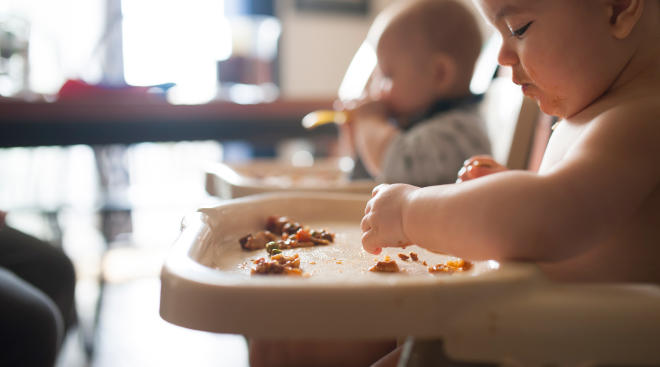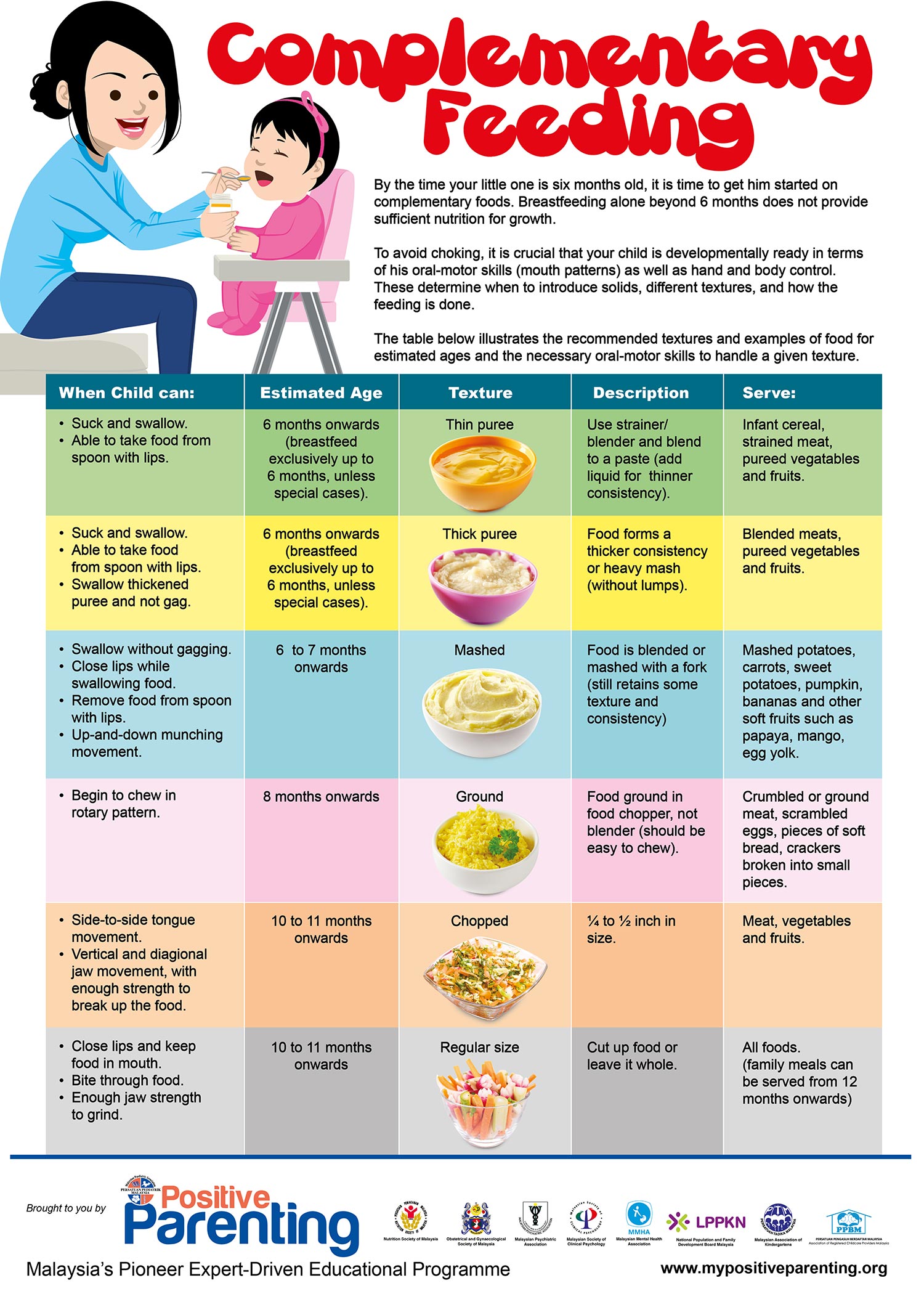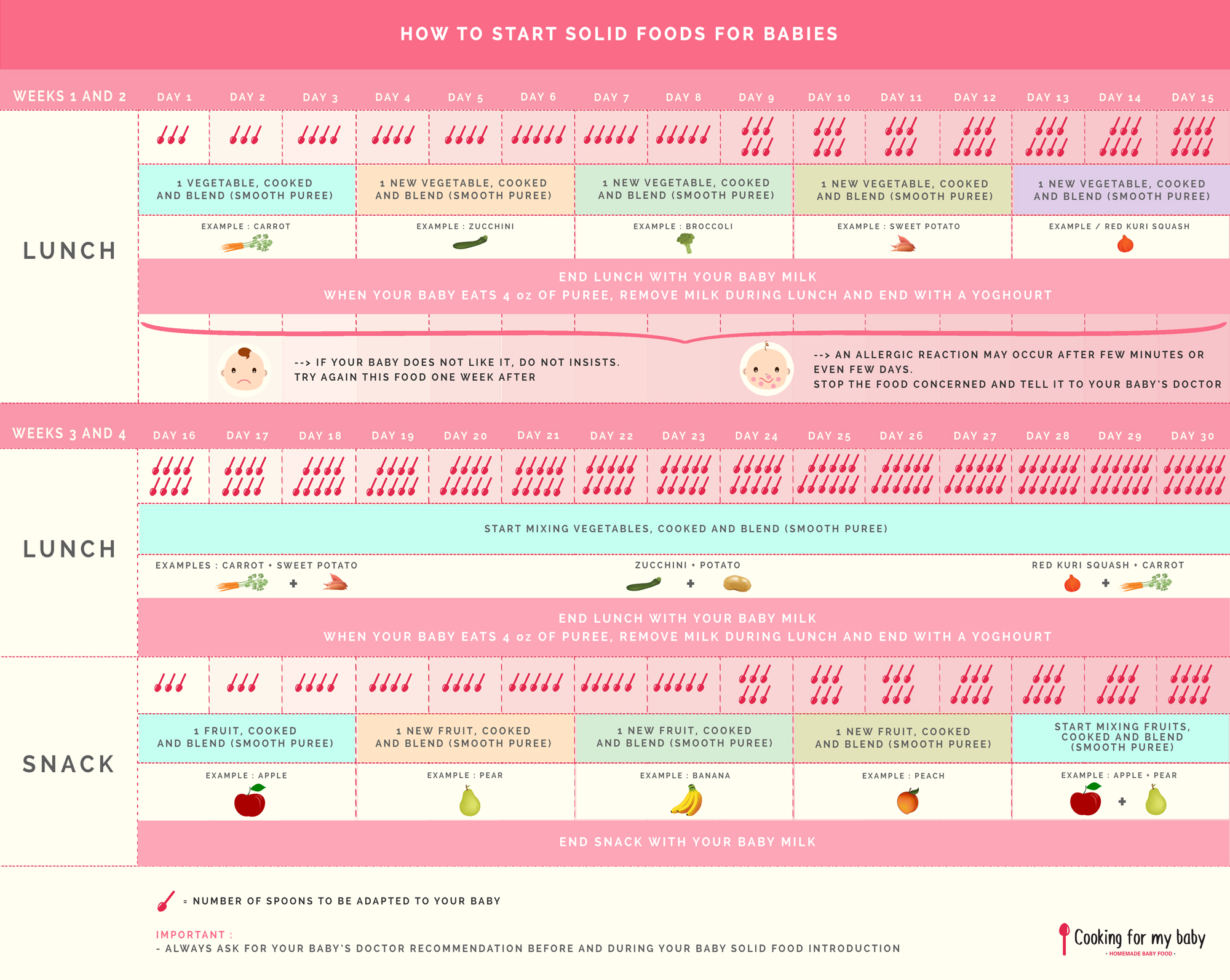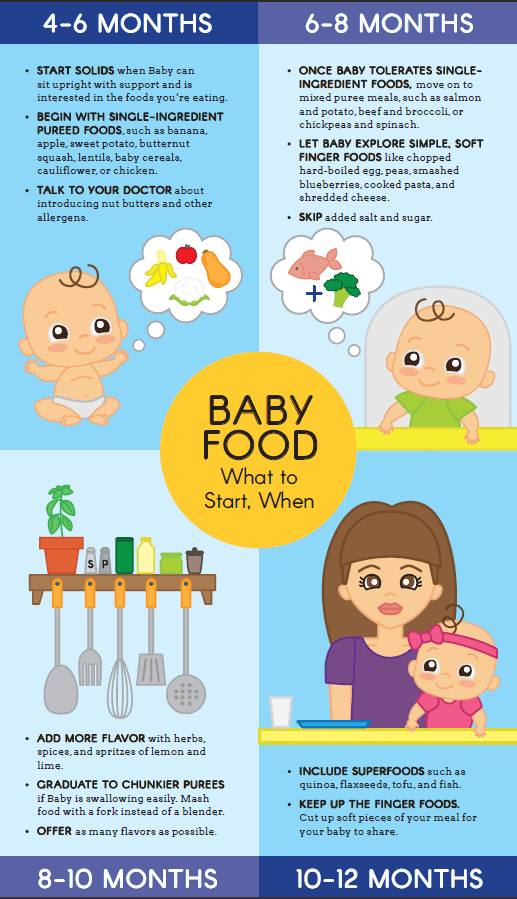Incorporate more finger foods with texture like yogurt cottage cheese. 9 to 12 months.
 Introducing Solids A Month By Month Schedule Free Printable
Introducing Solids A Month By Month Schedule Free Printable
Mashed butternut squash green beans and avocados can also be a great place to start when introducing solid foods.

Solid foods for infants. Beans such as lentils. However many infants and children do not receive optimal feeding. You can use less water for a thicker puree as your baby gets used to the new foods.
Start with foods that contain iron which babies need for many different aspects of their development. This also gives the right amount of calories and protein that your baby needs. Meat poultry cooked whole egg fish tofu and well-cooked legumes beans peas lentils are good sources of iron.
The first foods usually vary from culture to culture and from family to family. The addition of solid foods to an infants diet is required to provide adequate nutrition as eventually an infant will be unable to consume a sufficient volume of breast milk to meet their nutritional needs. Also dont offer hard foods such as seeds nuts popcorn and hard candy that cant be changed to make them safe options.
Mix cereal with 4 to 5 teaspoons breast milk or formula. Up to 6 months old. Traditionally pediatricians have recommended starting with thin fruit or vegetable purees or baby cereals and then gradually advancing in texture to soft finger foods like pliable pieces of.
There are many ways to introduce solid food. How to Make Broccoli for Baby Food Puree Place 2 cups of broccoli florets in a steamer basket over boiling water and steam for 10-12 minutes until tender. As your baby progresses in eating solid foods dont offer hot dogs chunks of meat or cheese grapes raw vegetables or fruit chunks unless theyre cut up into small pieces.
This helps them learn how to chew move solid food around their mouth and swallow. Additionally single-ingredient pureed fruits such as berries bananas and pears can be foods that your baby will enjoy since they are naturally sweet. Once you have started introducing solid foods from around 6 months of age try to move your baby on from pureed or blended foods to mashed lumpy or finger foods as soon as they can manage them.
When your child is about 6 months old you can start introducing him or her to foods and drinks other than breast milk and infant formula. The foods and drinks you feed your child are sometimes called complementary foods. Tofu Tofu is full of protein healthy fats iron and zinc.
At 6 months start giving your baby just two to three spoonfuls of soft food such as porridge mashed fruits or vegetables twice a day. It will be very runny Increase to 1 tablespoon of pureed food or 1 tablespoon of cereal mixed with breast milk or formula twice a day. Alert icon You can think of these as complementing or adding to the breast milk or infant formula that you continue to feed your child.
Some babies like to start with mashed lumpy or finger foods. Start feeding both breastfed and non-breastfed babies solid foods at 6 months. From pureed carrots or roasted cauliflower to fresh leafy greens offer your baby different vegetables to see what they like best.
The timing of this important dietary change for infants born preterm. Lots of babies like it since it has such a mild flavor. Introduce one single-ingredient food at a time.
Pea-sized pieces of cooked chicken turkey or other meats or boneless fish. Transfer to blender and puree for 1-2 minutes adding in 14 cup of liquid water breastmilk or formula until you have a smooth puree. Waiting too long can put your baby at risk.
By the time he or she is 7 or 8 months old your child can eat a variety of foods from different food groups. The introduction of solid foods usually starts at 6 months of age. There are lots of healthy baby-friendly foods out there but these 10 recommended by doctors and nutritionists alike stand out from the pack.
Within a few months of starting solid foods your babys daily diet should include a variety of foods such as breast milk formula or both. Chopped ground or mashed foods As soon as your child is able transition him away from smooth purees. If youre giving cereal gradually thicken the consistency by using less liquid.
Baby cereals are available premixed in individual containers or dry to which you can add breast milk formula or water. Your child can begin eating solid foods at about 6 months old. For example only about 44 of infants aged 06 months worldwide were exclusively breastfed over the period of 2015-2020.
When trying new foods that are dry or chewy such as peanut butter cheese or dried beans watch your infant closely to make sure they dont choke. Introduction of nutritionally-adequate and safe complementary solid foods at 6 months together with continued breastfeeding up to 2 years of age or beyond. Check with your babys pediatrician for their recommendation on when to introduce solid foods to your babys diet.
Try giving one new food to the baby only once every 2-3 days so you can tell if they digest each one well. These foods include infant cereals meat or other proteins fruits vegetables grains yogurts and cheeses and more.
Beginning Solid Foods When you find that your baby is ready for solid foods consider skipping the boxed cereal and starting out with avocado sweet potato banana or pear. This innate reflex pushes out any solid objects to prevent choking and fades away between the fourth and sixth month.
 When To Start Solid Foods Babywise Life
When To Start Solid Foods Babywise Life
1 The ages that babies can accomplish these tasks will vary which is why pediatricians urge parents to move slowly on solid food.

Babies and solid food. These foods include well-cooked egg peanut butter wheat from wheat-based breads cereals and pasta and cows milk but not as a main drink. For most foods bread pasta cereal soft fruits and tender cooked vegetables and meats this works perfectly well. Start introducing solids at around six months but not before four months by giving your baby a taste of smooth foods once a day after a breastfeed or formula feed.
Regardless of which approach you take aim to have your baby self-feeding finger foods by 9 months old. After a period of about 4-6 months nutrition from milk either formula or breast milk is not sufficient for the babys nutritional needs and solid foods need to be added to the babys diet. After that you can start solid foods when your baby show signs of readiness.
Theyll still be getting most of their energy and nutrients from breast milk or first infant formula. If it is bedtime or the baby is about to nap many parents offer the milk so as to provide the comfort factor. To make your baby accept solids as her food now feed her with a little bottle or nurse her and after that offer her a taste of the new food comprising of a teaspoon or two.
Dont offer any hard raw foods such as apple. After washing hands with soap start by giving your baby just two to three spoonfuls of soft food such as porridge mashed fruits or vegetables twice a day. Introducing your baby to solid foods sometimes called complementary feeding or weaning should start when your baby is around 6 months old.
Either way as long as the baby likes the new food. Add pureed prunes to her diet to aid digestion and keep things moving. Baby-led weaning or what we call Finger Food First is gaining international recognition.
Aside from age moms can also look for the following signs that could mean that their baby is ready for solid food such as. Starting solid foods before your baby is ready will not increase his sleep at night is not necessary for larger babies and does not initially increase calories. It is also important that the baby can sit upright with limited support and control the head and neck.
The DOH recommends that moms introduce semi-solid food to their babies at six months of age. Babies are born with a tongue-thrust reflex. Some Signs of readiness.
When to feed your baby solid foods. Baby is about six months old. Showing interest in food and an increased appetite are signs that a baby is ready to be introduced to solid foods.
Also dont offer hard foods such as seeds nuts popcorn and hard candy that cant be changed to make them safe options. Serve pureed prunes alone or mixed with other foods such as oatmeal cereal or applesauce for a naturally sweet treat. At first your little one will keep it simple with just a few teaspoons of a one-ingredient food like a pureed fruit veggie or meat every day.
As your baby progresses in eating solid foods dont offer hot dogs chunks of meat or cheese grapes raw vegetables or fruit chunks unless theyre cut up into small pieces. All babies including babies with a high allergy risk should try solid foods that cause allergies from around six months of age. Around six months of age most babies show signs that they are ready to try new foods.
For the first 4 to 6 months breast milk or formula is the only food your baby needs. There are definitely some foods that you should avoid giving your child at this stage. Delaying solid foods until your baby is six months old also reduces the chances of gagging and choking.
Infants use their gums to help mash their food so that it can be swallowed. He needs to start eating solid foods in addition to breastmilk to keep up with his growing needs. As your baby becomes more used to solids increase to two or three times a day with slightly larger servings.
At the beginning how much your baby eats is less important than getting them used to the idea of eating. To be ready for solid foods your baby needs to be able to hold their head up open their mouth for the spoon and physically move the food from the front to the back of the mouth. Best foods for babies.
You should give your. Whether youve begun with purees or are starting solids just with finger foods many babies enjoy experimenting with self-feeding from an early age. Baby can hold his head in a steady upright position Baby can sit on his own either supported or unsupported.
Solid foods for babies are foods that transition the baby from milk to adult food. Feed your baby whenever you see him give feeding signs. This approach involves skipping purées and spoon-feeding entirely to let babies self-feed with their fingers from the first bite.
Your baby may suffer from constipation when switching to solids as its a big change for her system.
If your baby tends to be fussy at the breast sometimes offering some solids before the breast can be helpful. Top 3 Tips for Introducing Solid Foods while Breastfeeding your Baby.
 When Should I Introduce Solid Foods To My Baby Positive Parenting
When Should I Introduce Solid Foods To My Baby Positive Parenting
The best way to do that is to breastfeed before offering solid foods rather than after.

Breastfeeding and solid foods. Also there is no reason that a baby needs both breast and solids every time he eats. Eating a variety of foods while breast-feeding will change the flavor of your breast milk. Choose a variety of whole grains as well as fruits and vegetables.
A general guide to the volume of breast milk needed per day while babies are exclusively breastfeeding in the first six months is often cited as 750-1035ml per day 25-35oz. For example honey and unpasteurized items typically juices milks and dairy products are considered off-limits for babies under a year old. Confusing signals in the first six months.
The start of solid foods is not meant to replace breastfeeding. As your baby grows older the more solid food he eats the less breast milk hell take. You should offer solids on a regular.
Good non-dairy sources of protein include meats fish peas beans chick peas lentils baked beans etc tofu and other soy products boiled eggs peanut and other nut butters if your child is not allergic. Focus on making healthy choices to help fuel your milk production. If your baby starts nursing less this can also cause your milk supply to diminish.
Current recommendations are that meats such as turkey chicken and beef should be added as one of the first solids to the breastfed infants diet. At this age the digestive tract has matured and is more able to break down solid food. I recommend launching straight into the leafy bitter greens such as spinach kale broccoli and brussels sproutsall well-cooked and pureed.
Also its very normal for picky-eating toddlers to go up and down for food preferences loving avocado one week but wont touch it the next. Knowing which foods are and arent recommended for infants. Opt for protein-rich foods such as lean meat eggs dairy beans lentils and seafood low in mercury.
What solid foods should my baby start out with. These foods include citrus fruits including oranges lemons and grapefruit kiwi strawberries peanuts and peanut butter eggs soy products including soy milk and tofu and cows milk including cheeses yogurt and ice cream. Salmon avocado eggs and nut butters all foods that pack a lot of nutrition in a small volume.
8 As baby takes more solid food towards the end of the first year this volume will gradually decrease. Once my kids turned two years old they were used to eating healthy foods and I no longer added my breast milk to it. High-fat foods that are especially filling for toddler tummies are.
A few tips to consider when balancing continued breastfeeding and solid foods include. Introduce your baby gradually to solid foods. Many mothers will offer breast milk first and then solids about 15-30 minutes later.
Jun 13 2018 - Explore Peachy Reyess board Breastfeeding and solid foods on Pinterest. First foods for babies. Meats are good sources of high-quality protein iron and zinc and provide greater nutritional value than cereals fruits or vegetables.
A few bites once a day is enough in the beginning but gradually increase. Experts recommend the continuation of breastfeeding or breast milk along with solid foods for at least the first year. Breastfeeding and Solids Schedule and how to introduce solids The World Health Organisation recommends that babies should be introduced solids between 4 and 6 months.
If breastfeeding and the introduction of solid foods both are going well it probably does not matter much. Exclusive breastfeeding until around six months followed by gradual introduction of solid foods may allow breastfeeding to delay the return of your periods which in turn helps to maintain your iron levels. See more ideas about Breastfeeding Baby stuff pregnancy New baby products.
Experts recommend continuing breastfeeding along with solid foods for as long as you and your baby desire. Breastfeeding and Solids Schedule I generally dont recommend a strict schedule with solids. Offer a few spoons of solid foods after breastfeeding your baby will be more open to trying new foods after a feed and ready to explore with new foods.
Baby-led weaning authors Rapley and Murkett eplain that between six and nine months the amount of breast milk a baby drinks should stay about the same while the amount of solid food gradually increases. Starting solids at or around 6 months is advised for a number of reasons. Breastfed babies may sometimes refuse to eat solids for one or more meals.
Between 6 months and a year breast milk is still the most important food in your babys diet so it is important to keep your milk supply up. I encourage my patients parents to treat this time like flavor boot camp and introduce as many vegetables fruits and whole grains as possible. Its important to make sure you are not replacing any breastfeeding sessions with solids especially in the beginning.
Good non-dairy sources of fats include soy and safflower oils flax seed and flax seed oil walnuts fish and fish oils avocado. Breastfeeding and breast milk are still very important as your child transitions to solid foods. Once she accepts them it might take some time continue breastfeeding as often as before and add solids as your babys appetite increases.
Can he hold his head up. NT Waidyatillake SC Dharmage KJ Allen.
 Can Feeding Babies Solid Foods As Early As 3 Months Lead To Better Sleep A New Study Says So
Can Feeding Babies Solid Foods As Early As 3 Months Lead To Better Sleep A New Study Says So
When can my baby begin solid foods.

American pediatric association solid food. The American Academy of Pediatrics AAP recommends that all infants children and adolescents take in enough vitamin D through supplements formula or cows milk to prevent complications from deficiency. Infant Food and Feeding Article Body Information about the onset and patterns of risk behaviors associated with overweight and obesity during infancy are showcased in the link below. Parents should wait 3 to.
Many sources of literature suggest that foods can be started at four months of age and. The American Academy of Pediatrics recommends the introduction of solid foods at 4 to 6 months of age exclusive breastfeeding for the first 4 to 6 months of age continued breastfeeding to the first birthday and beyond if possible and the use of infant formula for. Here is information from the American Academy of Pediatrics AAP to help you prepare for your babys transition to solid foods.
Your child can begin eating solid foods at about 6 months old. Thats when a babys digestive system is developmentally ready for food. Recommendations for complementary feedings of infants and young children have not varied significantly over the past 40 years.
The American Academy of Pediatrics says that for most children you do not need to give foods in a certain order. The American Academy of Pediatrics is dedicated to the health of all children. It appears that babies can choke on almost anything and this study provides reassurance about baby-led weaning in that the risk of choking seems to be comparable to traditional spoon.
Start finger foods and table foods once your baby can sit up well and can easily pick up soft small pieces of food that are well-cooked finely chopped or cut up. You will be fascinated and surprised - to see the types of foods that were offered to babies and the foods that were associated with choking episodes. Infant Food and Feeding.
An Oral History Fishbein Fellowship Genomics and Precision Health Hypertension Guidelines JAMA Network Audio JAMA Network Conferences Machine Learning Research Ethics Topics and Collections Special Communications FDA Approval and Regulation of. Below are the AAP American Academy of Pediatrics guidelines to starting solid foods. The practice of introducing complementary foods solid foods and liquids other than breast milk or infant formula during the first year of life has varied over time and across cultures.
Critical Congenital Heart Defects. Remember that each childs readiness depends on his own rate of development. Breast milk or formula is the only food your newborn needs.
But by ages 4 months to 6 months most babies are ready to begin eating solid foods as a complement to breast-feeding or formula-feeding. After age 6 months solid foods aid in the development of appropriate feeding and eating skills for all infants and provide additional nutrients to meet the Dietary Reference Intakes for breastfed infants. The American Academy of Pediatrics AAP hosts the Website and related Materials on its servers and makes them available via the Internet to subscribers for non-commercial research and education purposes and for use in providing healthcare services.
Guideline 1 recommends that the highest risk infants those with severe eczema andor egg allergy see definitions below be introduced to peanut as early as 4-6 months of age following successful feeding of other solid foods to ensure the infant is developmentally ready. Art and Images in Psychiatry Best of the JAMA Network Coronavirus Resource Center Digital Media Editorial Fellowship Evidence-Based Medicine. Feeding your baby solid food too early may result in poor feeding experiences and increased weight gain in both infancy and early childhood.
By the time he or she is 7 or 8 months old your child can eat a variety of foods from different food groups. Cows milk was purposely excluded in this review because it is not given as a solid food. Pediatric feeding disorder is most common in young children and affects an estimated 3 to 10 of all children49 If a pediatric feeding disorder is suspected a multidisciplinary approach to the.
AAP SOLID FOOD GUIDELINES. Complementary solid foods can be introduced between ages 4 and 6 months when the infant is developmentally ready. Pediatricians recommend 4 to 6 months as the starting age because thats usually when most infants are developmentally ready for solid foods.
Prior guidelines recommended starting solids at four months but research has shown that introducing solid. Your baby should be able to sit in a high chair a feeding seat or an infant. This website is based off the AAP solid food guidelines which currently recommend the introduction of solid foods at 6 months of age and up.
201848810001015 To review all available literature to determine if the timing of solid food introduction influences the risk of atopic eczema. In consideration of payment of the applicable subscription fee the AAP is willing to. The American Academy of Pediatrics recommends exclusive breast-feeding for the first six months after birth.
The American Academy of Pediatrics and World Health Organization recommend that complementary foods be introduced around six months of age. Children enrolled in 11 cohort studies 2 case controls 1 cross-sectional study and 2. After the infant has accepted iron- fortified infant cereal then pureed or soft fruits vegetables and meats can be offered.
Solid foods can be introduced as early as six months of age according to guidelines from the American Academy of Pediatrics and the World Health Organization. Only one new food should be introduced at a time. Complementary solid foods can be introduced between ages 4 and 6 months when the infant is developmentally ready.
There is some debate about when babies should start solid foods. If your baby was born prematurely ask your health visitor or GP for advice on when to start introducing solid foods.
 How To Start Solid Foods For Babies 30 Day Schedule
How To Start Solid Foods For Babies 30 Day Schedule
These foods include infant cereals meat or other proteins fruits vegetables grains yogurts and cheeses and more.

Infant solid food chart. The AAPs Committee on Nutrition recommends starting solids sometime between 4 and 6 months. However the exact first food is fairly insignificant instead its the variety of healthy foods you serve your baby in their first few months of. Please note that it is important to discuss the introduction of all new foods with your pediatrician as he or she will be acquainted with your familys medical history and will be able to advise you if certain foods are not appropriate for your child.
When your baby is developmentally ready for solids typically around 4 to 6 months talk to his doctor about introducing solid foodsThe first bites are mostly about him getting used to the idea of having something different in his mouth. Introducing solid foods to your little one is a huge milestone that lays the foundation for healthy eating habits. The foods and drinks you feed your child are sometimes called complementary foods.
And while cereal is a traditional first food in the United States its fine to start with mashed fruits or vegetables instead. If you want to give your baby a taste of tofu at age 6 months go ahead even though its not listed on our chart until age 8 months. If your child is eating infant cereals it is important to offer a variety of fortified alert icon infant cereals such as oat barley and multi-grain instead of only rice cereal.
If youre ready to start solids with a baby here are some foods you may want to start with. In the first days then 13 oz. Baby Food Chart For Babys First Year.
This is one stage that I know can be a very nerve wracking and scary for many parents. Alert icon You can think of these as complementing or adding to the breast milk or infant formula that you continue to feed your child. Signs your baby is ready for solid foods.
Start with a very small amount 1 to 2 teaspoons of a single-ingredient puree. American Academy of Pediatrics Starting Solid Foods January 2018. As with the solid food charts found on individual pages this combined baby solid food chart is a general guideline showing solid foods for baby that are age.
The lists below shows the amounts of breast milk formula and food that most infants up to 1 year of age need. Solid food shouldnt take the place of milk as the main source of nutrients. 2 weeks to 2 months.
Solid food chart for babys First year Baby food charts for 6 to 12 month baby - Collection of baby food chart or diet chart or meal plan for babies of age 6-12 months Each food chart has the information on what foods can be included at the particular month with sample meal plan and approximate quantity of food. Introducing solids to your infant is an exciting milestone. Age Ounces per feeding Solid foods.
This also gives the right amount of calories and protein that your baby needs. This list is perhaps more broad than you expect but more recent research shows that its a good idea to introduce potential allergenic foods earlier and that lots of flavor is a great way to set baby up for eating a range of foods as they grow. Once they turn 6 months old.
This page offers you the solid food charts in one handy location. In addition to breast milk or baby formula here are the solid foods you can introduce to your babys diet at each stage of development - or if your baby is readyBut remember you can. Up to 2 weeks of life5 oz.
There are 3 clear signs which when they appear together from around 6 months of age show your baby is ready for their first solid foods alongside breast milk or first infant formula. Heres everything you need to know about timelines safety and recommended menu itemsplus a simple baby food chart to print at home. This baby food chart makes it quick and easy to determine the best foods for baby at each stage.
Introducing solid foods to your baby is a big milestone. During this time babies typically stop using their tongues to push food out of their mouths and begin to develop the coordination to move solid food from the front of the mouth to the back for swallowing. Even within the AAP American Academy of Pediatrics there is a difference of opinion.
When your child is about 6 months old you can start introducing him or her to foods and drinks other than breast milk and infant formula. Many parents starting their babies on solid food will wonder what is the absolute best first food I can feed my baby looking for a concrete answer like peas or carrots. However the AAPs Breastfeeding Policy Statement.
Introducing Solid Foods to Babies 4 6 Month Old Baby Solid Food Charts for babies age 4 6 months. Combined Solid Food Charts For Babies from 4 to 12 months of Age. But by ages 4 months to 6 months most babies are ready to begin eating solid foods as a complement to breast-feeding or formula-feeding.
Indeed babies should still drink about 4-6 ounces per feeding when theyre 4 months old. 6 Month Baby Food Chart for Purees. Centers for Disease Control and Prevention Foods and Drinks to Encourage December 2018.
This feeding plan provides 8 to 15 protein 35 to 55 fat and 30 to 50 carbohydrate.